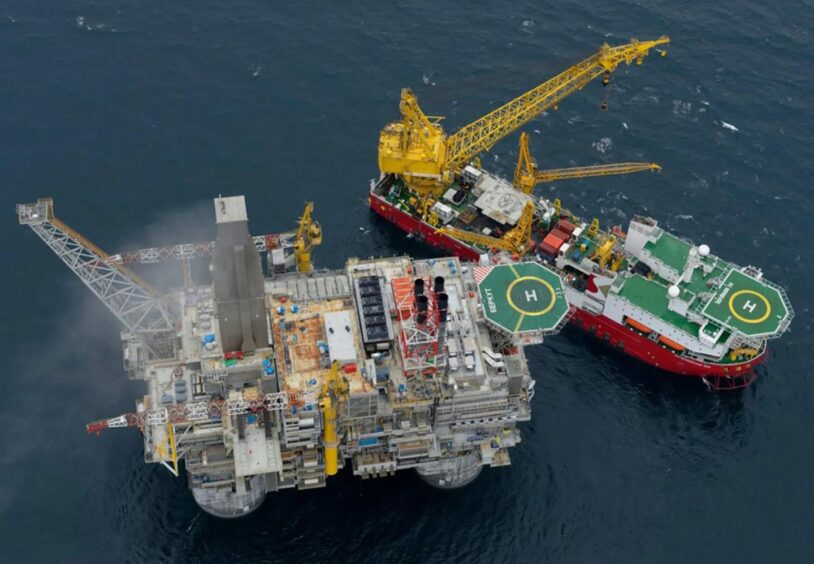
The energy transition is coming but conventional work remains at the heart of the energy industry – and will continue to play a major role in Kent’s plans.
Currently, conventional work accounts for half of the company’s revenue, while low carbon and renewable energy is at 20%. Processing and chemicals make up the last 30%.
“Over the next five years, the plan is to balance that out, increasing low carbon and chemicals to around one third each. Conventional will drop as a percentage – but grow in dollars,” Kent CEO John Gilley told Energy Voice last week.
“We’re pivoting into the energy transition but it’s going to be a big challenge to drive a third of revenues from that,” he continued.
Different parts of the world are going at different speeds in the energy transition. The UK has an early start, Gilley said, while Colombia’s Ecopetrol, for example, is “really hot” for change.
“We can take that expertise from the UK and globalise it. We can tie up engineering centres across the world, we don’t have to be in the same place to collaborate – that’s going to be crucial for the energy transition,” he said.
Increased global connectivity will offer one way for the industry to access the right skills at the right time, he said. “A lot of companies claim to have expertise, it’s not always the case. You have to a dynamic global workforce.”
Gilley said Kent’s offering was characterised by its agility. “We compete with Wood and Worley, but we’re a fraction of their sizes. We’re more nimble and we can offer direct access to our senior executives, that’s an approach that’s gaining traction.”
The Middle East has played a dominant role in the world’s energy systems and the states will continue to do so. “The NOCs are going to produce oil and gas for longer than the IOCs … [the NOCs] are accelerating production, which is part of the reason we’re seeing conventional energy grow.”
Moving energy
Ensuring an orderly transition will pose challenges for countries and companies alike. The scale of the challenge can be seen in some of the problems manifesting in the LNG market.
“It was blatantly obvious to me that there was underinvestment in LNG,” Gilley said. The invasion of Ukraine has taken this up a notch, but the problem had been growing before this.
More final investment decisions (FIDs) will come, the Kent head said, picking out Papua New Guinea, Mozambique, the US Gulf Coast and United Arab Emirates as making progress here.
“I see LNG as a transition fuel. It’s one third of the carbon of traditional fossil fuels. Everything we do is in the energy transition space, even in the conventional space we’re decarbonising,” he said.
There has been substantial discussion around hydrogen as a future fuel source, potentially coming to replace LNG in shipped deliveries.
“Hydrogen will not be here in time, we have to continue investing in LNG,” Gilley said. “There’s a point where those lines cross but there’s no great scale in hydrogen for years to come.”
Kent is working on some hydrogen projects. “It’s really important to get on board and prove we can build at scale,” Gilley said. “But if you don’t invest in LNG, gas prices will increase. Developing countries will get it in the neck, they can’t afford it.”
Building the bench
Recent energy price spikes, and the invasion of Ukraine, has driven renewed interest in energy security. Conventional energy sources have benefited. “We’ve seen strong quarter on quarter growth, our conventional business is growing faster than we had imagined.”
A number of operators are recycling revenues from their core hydrocarbons business to stake out a position in the energy transition and Kent is no different.
“It’s temporary,” Gilley said. “We’re hiring people to keep on the bench so we can take that [opportunity] when it comes. We have to fund that bench strength.”
Kent plans to grow. Next year, Gilley said the company intended to reach $1.4 billion in revenue. “The energy transition story is evolving at great pace,” he said. “The ultimate aim is to increase earnings but not necessarily the head count.”
“FIDs have fired up in the last 12 months and energy transition stocks are clearly overpriced,” Gilley said, questioning share prices based on profits a decade in the future.
Investors have not wanted to touch conventional projects in 2019-2020. They started to change their minds in 2021. “We raised a Nordic bond to fund our acquisition last year. We had a good energy transition story but we’re far stronger now. I don’t see an issue with funding.”
Kent completed its acquisition of SNC Lavalin’s oil and gas division in mid-2021.
In the first quarter of 2022, Kent added $400 million to its backlog. This involved large contracts on conventional projects, such as LNG in Canada and Middle Eastern work, alongside energy transition agreements such as a CO2 project in the UK. “We’re punching above our weight,” Gilley said.
Kent is not ruling out further niche acquisitions but nothing along the same scale as the deal completed last year. “We’re weighing up our options. I’d love to list [in London in] three to four years’ time.” Bluewater, the private equity house, is Kent’s majority shareholder.
Local needs
While there is considerable interest in the energy transition, just as important is the question of local benefits. “The biggest thing is investing in nationals” in Saudi Arabia, Oman and the UAE, Gilley said.
Kent aims to meet these challenges through recruitment campaigns. “We try to move them out of their countries and then bring them back as experts. We’ve had varying levels of success,” he explained. “You won’t win contracts if you can show the workforce is local. It is a struggle.”
Concerns around the share of local content is of course not restricted to the Middle East.
“It depends country to country,” Gilley said. Governments must work out what needs to be brought in from outside “and then force contractors through some structures to employ from the local market”.
Employing locals can be cost effective. Kent, Gilley explained, tends to bring in expatriates for work in the first year and then pulls that expertise back “if we can”.
Moving people
Speaking to Kent’s CEO, it was clear how much emphasis the company’s management put on the working culture.
Kent held a number of discussions with its employees in order to bring them together to decide on what the company’s culture may be. “We are looking to be a company that has a tone of voice that’s different, that looks at things differently.”
One of the outcomes of this engagement programme was a drive to create a culture where “people can belong”, Gilley said. “We want everyone to bring their weirdness to work. That’s where the real magic happens,” he continued.
Is it possible to create a company culture that spans the world, given the multiplicity of potentially conflicting morals and laws?
Gilley believes it is.
He gave the example of a recent seminar on LGBTQ issues, where the question of whether everyone in the company should be invited to participate had come up. Gilley said yes, even though the country works in places, such as Saudi Arabia, where this is illegal.
“We’re all Kent employees. I have two nationalities, Irish and Kent, and we’re saying the same thing to our employees.”
The Kent CEO ended up having talks with one Middle Eastern employee opposed to the seminar. “It’s about how to be liberal and recognise different persuasions. We’re just asking for tolerance,” the executive said.
Recommended for you


 © Supplied by Kent
© Supplied by Kent